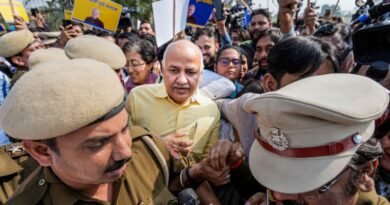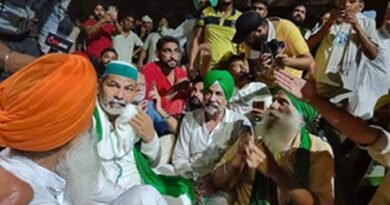Park, gym & a grant — BJP is wooing music maestro Pandit Jasraj’s fans in Haryana
Jasraj’s family comes from Pili Mandori, a village that falls under Sirsa parliamentary seat. BJP won it in 2019 but recent developments show INLD could be gaining ground again.
Chandigarh January 30 dmanewsdesk: On 31 December 2003, Pandit Jasraj, one of the greatest exponents of Indian classical music, visited his village of Pili Mandori in Haryana’s Fatehabad district after 27 years.
As his car reached the village boundary, he was so overcome with emotion that he got off the vehicle, took a fistful of soil, and touched it to his forehead.
Later, he addressed a crowd of people, many of whom had come from neighbouring villages to hear him.
“Main thane kih kahun, maine to kih shabad hie koni pan lagriha (What can I say to you? I am short of words),” said Jasraj in a chaste Bagari dialect as he wiped away his tears with a handtowel. “Mera mann to kare se ke is rajj mein lot jaun. Mere liye yeh bhumi Brindavan se kam nahin (I feel like rolling on the soil of this village. This place is no less than Vrindavan for me).”
After that, Jasraj, who was lovingly called “Jasia” as a child, would visit Pili Mandori every year until his death in August 2020, even celebrating his birthday in the village in 2014.
On Saturday, Pandit Jasraj Cultural Foundation, a non-government organisation set up by Jasraj’s daughter Durga, organised a cultural event to mark the maestro’s 93rd birth anniversary.
The event, which was held at the Hotel Taj in Chandigarh, saw Haryana Chief Minister Manohar Lal Khattar and Bollywood singer Sonu Nigam in attendance.
Haryana Chief Minister Khattar, the chief guest at the event, announced a slew of development projects for the village and a grant of Rs 21 lakh for Pandit Jasraj Cultural Foundation.
Durga Jasraj, herself a vocalist and a television presenter, heads the foundation.
Although primarily cultural, the event wasn’t bereft of political significance, coming as it did less than two years before the general and the Haryana assembly elections of 2024.
The village of Pili Mandori falls under the Sirsa parliamentary constituency and is part of Fatehabad assembly segment. The area, which came under the Bhattu Kalan segment before the 2007 delimitation, has long been seen as the stronghold of the Indian National Lok Dal — more specifically, the powerful but now split Chautala clan.
Despite being a Chautala stronghold, the Bharatiya Janata Party won both the parliamentary and the assembly seat in 2019 — a development that was in part seen as a result of a vertical split in INLD.
More recently, however, the tide appears to be turning back in INLD’s favour. The party won 10 of 13 Zilla Parishad seats in Sirsa, the home district of INLD patriarch O.P. Chautala — a boost to a party that had been all but wiped out in the 2019 assembly polls.
Park, gymnasium, library — what Khattar govt promised Pili Mandori village
Saturday’s event was held over two years after Pandit Jasraj passed away at his house in New Jersey.
Among the various measures that Khattar announced for the village were welcome gates at both of its entrances, two volleyball nurseries for boys and girls, a park, a gymnasium, and a new library building.
Addressing the gathering, Khattar said that the state government had drawn up a “framework” for the development of Pandit Jasraj’s village.
“It is a matter of pride that Pandit Jasraj ji was born in Haryana. He is considered one of the greatest Indian classical vocalists. His contribution is a treasure of the musical world. I assure you I will extend all possible cooperation to the foundation for carrying forward the legacy of Pandit Jasraj ji,” he said at the event.
The work of any government isn’t limited to infrastructural development but extends to working for the welfare of society, he said — “instilling in it a social responsibility is also one of the utmost duties of any government”.
During her speech, Durga Jasraj announced that her foundation will undertake various cultural activities in the state to “develop and sustain cultural awareness”.
‘Unparalleled genius’
Born on 28 January 1930, Pandit Jasraj came from a family of musicians. His father Motiram and uncle Jyotiram were singers at the royal court in Jammu and Kashmir.
Jasraj left his village and continued his musical journey under the tutelage of his older brother Pandit Maniram. He married actor-director V. Shantaram’s daughter Madhura. Apart from Durga, the couple also had a son, Sarang Dev, a music director known for movies such as Saleem Langde Pe Mat Ro (1989), Naseem (1995), and Om Namah Shivay (1997).
Members of his extended family are also part of the world of cinema — his two nieces Sulakshana Pandit and Vijayeta Pandit were film actresses while his nephews Jatin and Lalit are well-known Bollywood music directors.
Known for his exceptional control over his voice, his ability to convey deep emotions through his music, and his innovative approach to classical music, Pandit Jasraj quickly established himself as one of the leading exponents of the Mewati style of Hindustani classical music, called the Mewati gharana.
It was he who helped popularise the gharana, thus helping to preserve and promote this rich tradition in Haryana and across India.
Pandit Jasraj’s contribution to Indian classical music has been recognised with numerous awards throughout his career, among them the Padma Vibhushan, India’s second-highest civilian award, and the Sangeet Natak Akademi Award, the country’s highest award for performing arts.
Speaking to ThePrint, his daughter Durga said that through the foundation, she hoped to continue what her father had been doing for music.
“Ours has been a family of musicians. However, the place my father Pandit Jasraj occupied in the field of Indian classical music is unparalleled,” she told ThePrint.
Established last year with her partner Neeraj Jaitley, the foundation promotes young musicians in all genres of music and focuses on helping manufacturers of musical instruments.
“It’s an irony that in our country, a musician doesn’t consider himself or herself unless their song comes in a Bollywood movie. This is not the case in the West. The music industry there isn’t at all dependent on Hollywood. Music can be for the music alone too. Music can have its own audience.”
(Edited by Uttara Ramaswamy)
Source: The Print




